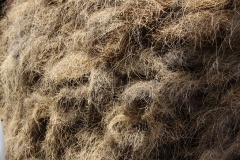Esparto
| Infobox on Esparto | |
|---|---|
| Example of Esparto |  |
| Facts | |
| Origin | - |
| Stowage factor (in m3/t) | 3-3,5 m3/t (bales) |
| Humidity / moisture |
|
| Ventilation | - |
| Risk factors | See text |
Esparto
Description / Application
Esparto, or esparto grass, also known as alpha/alfa grass" or "needle grass", is a perennial grass grown in northwest Africa and the southern part of the Iberian Peninsula employed for crafts (cords, baskets, espadrilles, etc.).
It is also used for fibre production for paper making. The fibre makes a high quality paper often used in book manufacturing. First used in Great Britain in 1850, it has been extensively used there and in Europe, but is rarely found in the United States because of the cost of transport. It is usually combined with 5-10% wood pulp.
The "Spanish" grade is usually regarded as the higher-quality, while the "Tripoli" grade, from Africa, is the lesser in quality. The fibres are fairly short in relation to their width, yet do not create any significant amount of dust. Because of the short fibre length, the tensile strength of the paper is less than that of many other papers, but its resistance to shrinkage and stretching is superior, and the paper is a well-filled, dense paper with excellent inking qualities. It also has very good folding properties.
Lygeum spartum, another species of grass, is also used in combination with true esparto, and is also sometimes called "esparto grass" or albardine.
Some manufacturers of rolling paper may use esparto, which might lead to a slightly higher carcinogen level when burned.
Shipment / Storage / Risk factors
Esparto is a strong grass fibre which, when dry, coils itself into the shape of a cylindrical rod.
Sound esparto has a characteristic yellow colour. Packed in bales and used in the manufacture of paper and textiles. Traces of damage to esparto are revealed by carefully unrolling the leaf and presenting it flat. Esparto has a storage life of approx. 3 months.
Liable to heat if stored in a poorly ventilated and humid place. Highly inflammable with possible spontaneous combustion if bales wet and in contact with oils or fats.
May turn black with wetting or prolonged stacking and be unsuitable to be treated in paper mills, but if the solidity of the fibre is unaffected, has no marked influence upon its value in the textile industry. Is subject to ordinary loss in weight due to drying out, but may gain in weight due to absorption of moisture of extraneous nature. Prone to odours which will lessen value.
Consult the IMO Code for overseas transport (IMO Class 4 – Flammable).











